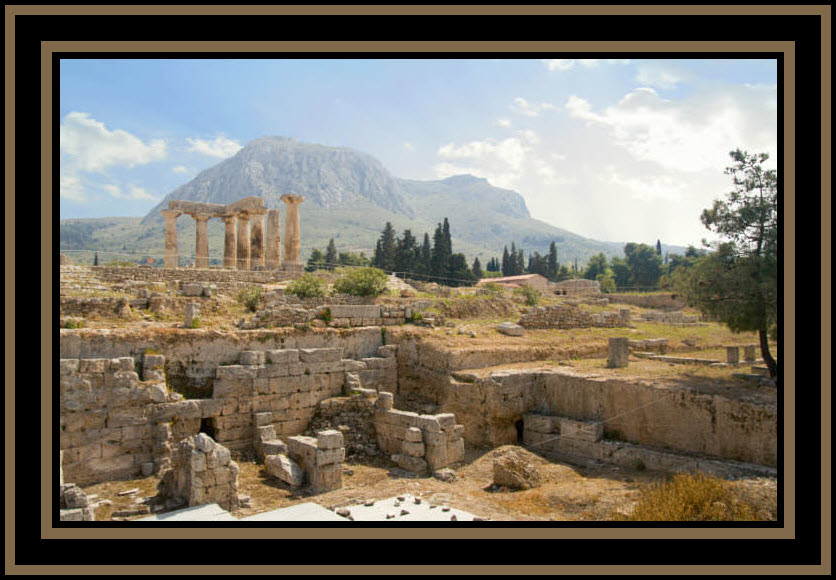

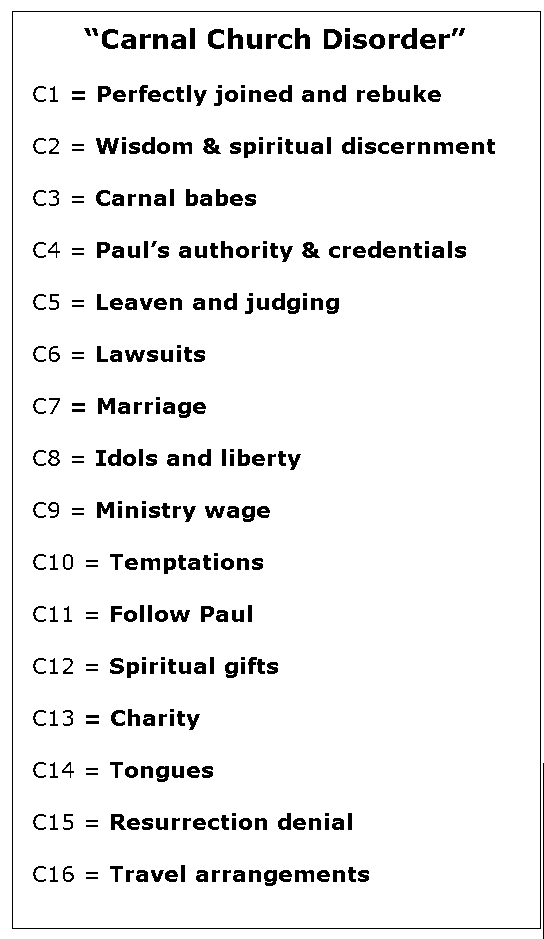
“Now I beseech you, brethren, by the name of our Lord Jesus Christ, that ye all speak the same thing, and that there be no divisions among you; but that ye be perfectly joined together in the same mind and in the same judgment.”
(1Cor 1:10)
“Be ye followers of me, even
as I also am of Christ.” (1Cor11:1)
“Church disorders of factions, immorality, lawsuits, meats
offered
to idols, Lord’s supper abuse, divisions,
strifes, false apostles, marriage
problems, disorderly conduct of assemblies, lack of ministry support,
self-promotion,
women’s role in the church, resurrection heresies”
1. AUTHOR,
DATE, PLACE: Paul,
57AD, Ephesus.
2. TO WHOM
IS IT WRITTEN: The
Corinthian church
3. THEME: Christian
life, conduct and unity.
4. PURPOSE:
To rebuke,
exhort, admonish but encourage the
fleshy and vice ridden church at Corinth.
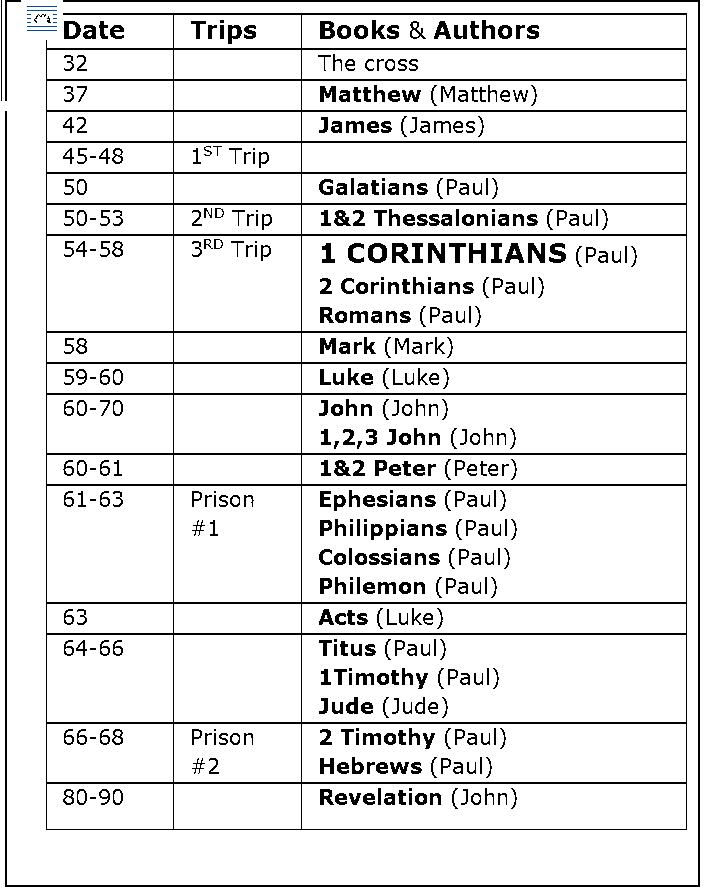
6. CITY OF
CORINTH:
Corinth
was the most important city of all
Greece in Paul’s day. The wealth was vast and men spent much of their
days in
sporting tournaments, plays, speeches and entertainments – much like
all cities
in the world today. Wasteful use of time and energy in frivolous
diversions
combined with luxury and public immorality was rife among this vast
industrial
and seafaring city. Corinth attracted lots of travellers and foreigners
from
the East and the West. “Sex, drugs rock and roll” were the pursuits.
Like today
the four main things were money, sex, entertainment and education. It
was a
city of much ‘culture’ and art, abounding in large numbers of
philosophy
schools, language schools and universities.
7. OT
QUOTES:
There
are 21 quotes from the Old Testament
and best summed with For it is
written, I will destroy the wisdom of the wise, and will bring
to nothing the understanding of the prudent. 1 Cor 1:19
which comes
from the OT “Therefore, behold, I will proceed to do a
marvellous work among this
people, even a marvellous work and a wonder: for the
wisdom of their wise men shall perish, and the understanding of
their prudent men shall be hid.” (Isaiah
29:14)
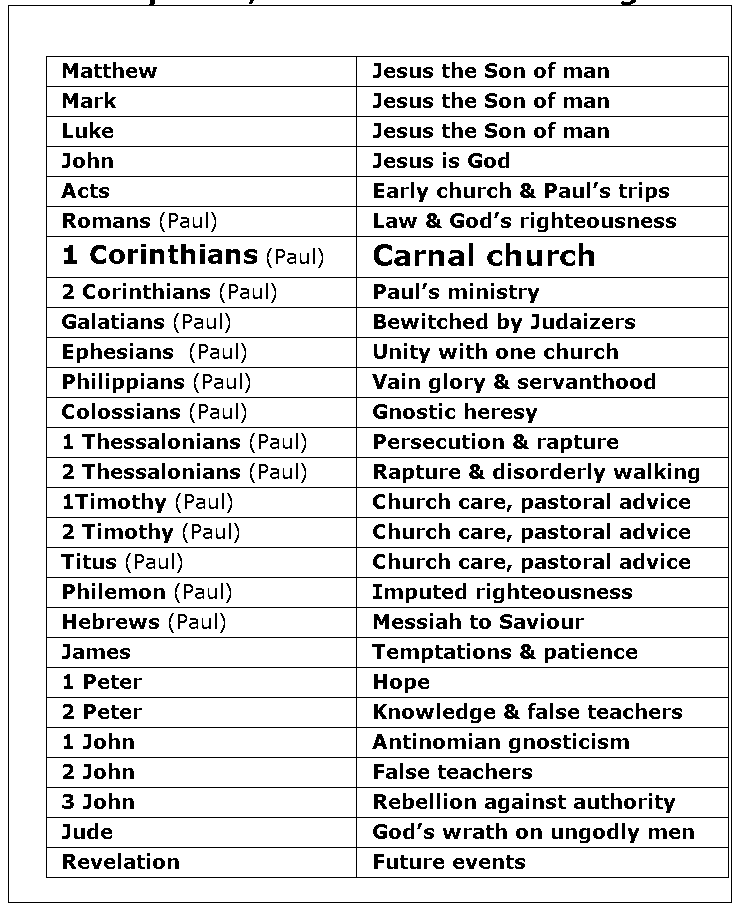
The phrase ‘the Lord’
is found 49 times
in 43 verses. Much of the confusion in the Corinthian church
stemmed from
the fact that they had lost sight of the fact the Jesus Christ was to
be their
Lord and not just their Saviour – like most churches today.
8.
RELIGIOUS MIX:
Most
cities of
this size had large populations of Jews with their appropriate moral
standards
and religious beliefs, however the city itself was the
centre of the pagan
worship of Venus – the equivalent to
a Catholic Mary but with ‘considerably’ looser morals one might say.
CHAPTER
SUMMARIES
Ch 1 = Perfectly joined and
rebuke
Ch 2 = Wisdom &
spiritual
discernment
Ch 3 = Carnal Babes
Ch 4 = Paul’s authority
& credentials
Ch 5 = Leaven and
judging
Ch 6 = Lawsuits
Ch 7 = Marriage
Ch 8 = Idols and liberty
Ch 9 = Ministry wage
Ch 10 = Temptations
Ch 11 = Follow Paul
Ch 12 = Spiritual gifts
Ch 13 = Charity
Ch 14 = Tongues
Ch 15 = Resurrection denial
Ch 16 = Travel arrangements
Ch 1 = Perfectly joined and
a rebuke
As they
were no large church buildings at
Corinth when Paul arrives, they were meeting in separate homes and
rooms and
these small congregations were under their own leadership. In this
wicked city,
these home churches were developing into rival
and competing groups. Taking on the Greek characteristics of the
city with
its prideful intellectual and philosophical arrogance, these home
churches were
rallying around the leaders of various
factions (v11-13), with each trying to stamp their own version of
Christianity on Christ. So Paul calls for unity (v19). He calls out the
various
factions (v11-13) and mentions water
baptism (v14-18) saying that churches were at risk of making the cross and the preaching of the
cross of none effect with this
practice (v17-18).
He then
stresses that they had better all ‘climb
down’ and back away from their wise pet theories (v19-22) and start to
concentrate
and emphasize Christ - the power and the wisdom of God (v24). He says
it is
better to be foolish, weak and base as God doesn’t call the powerful,
mighty,
wise or noble (v26-29).
Ch 2 = Wisdom &
spiritual discernment
As Athens
was a city very close in proximity
to Corinth, the philosophical arrogance
of Athens had permeated them. As we find today, churches of different
nations
reflect the cultural and social standards of the surrounding society.
So Paul
detects this arrogant, philosophical and knowledgeable stance appearing
in the
Corinthian churches and he deals them a scorching rebuke for it. He
says to
them “Leave off and climb down from your lofty mental heights and be
like me”
(v1-9) for God alone will reveal his wisdom (v9-11). Like Corinth,
churches
today live in cities with many universities and through their own
learning, not
God’s knowledge, religious leaders reveal the ‘gnostic, deeper and
hidden’
things of God from their own minds. Such that they say “The Bible
doesn’t mean
that and that word should be this and so on.” “Furthermore, the Bible
says what it really means ….”. All produced from their own wisdom and
false studies.
So Paul
points this out to them that he that
is spiritual judges all things by the spiritual standards set forth in
God’s
words of the Bible (v12-16).
Ch 3 = Carnal Babes
Paul then
breaks a few of their ‘spiritual
bones’ by establishing himself as a wise masterbuilder (v10) with
Christ as the
foundation (v11). He states that if the results of your work and what
you have
produced is any good, it will stand up against God’s fire (v12-15).
Once again
he alludes to the fact that they are crafty and foolish with the wisdom
of the
world (v18-19).
In essence
he says in common language “Look
you proud and arrogant fools, give yourself a punch in the head, take a
couple
of Panadol and have a good lie down. You must have God’s wisdom and
change your
thinking about the divisions you have created. Christ is the foundation
and
I, Paul, am the masterbuilder. I am here to destroy your philosophy,
both root
and branch. Be ye followers of me.”
(1Cor 4:16; 11:1)
Ch 4 = Paul’s authority
credentials
Paul says
they are like fatherless proud
children running around ignorantly instructing each other (v15) and so
he
appeals to them to be followers of him (v16). Like a good father Paul
says that
he won’t come to them with a rod of iron but in the spirit of meekness
and love
(v21) but he warns them that God has given the power to discern the
pretenders
with puffed speech and no power (v19) – and they’d better watch out.
Ch 5 = Leaven and
judging
He also
admonishes them to get their ‘judging
glasses’ on in other cases of brotherly sins (v11). He in no uncertain
terms
tells them that they must not associate with these fornicators,
idolaters,
railers, covetous and drunkards (v13). All these sinful behaviours are
infecting the rest of the church (v6).
Ch 6 = Lawsuits
Ch 7 = Marriage
As we read
Paul and his views on marriage, we
get the impression he seems to know a fair bit about the intimacies of
married
life. Was Paul ever married with a wife? Now some commentators conclude
that
Paul has been married and had lost his wife and this conclusion is
reached for
the following reason. In order to vote as a member of the Sanhedrin
(Acts
26:10) it was a necessary prerequisite to have a wife. Therefore they
assume
that Paul had been married with a wife as he seems to be a member.
However a
closer study of the scriptures reveals that he was not
a member but was merely given
the authority to act on the chief priests’ behalf (Read Acts 26:10
carefully). This makes sense because along with many things that were
revealed
to him in the third heaven (2Cor 12:2-4), God could have easily put
this
knowledge of marriage into his head as well.
Ch 8 = Idols and liberty
Ch 9 = Ministry wage
He goes on
further to say one of the
abilities that the Lord had given him was that he was able to appear
all things
to all men in order to win some to Christ (v20-23). Some mistakenly
equate
being a castaway with loss of
salvation (v27) but this is not
correct. He would be still saved but a cast-off. A fuller understanding
of this
can be gained from studying the scriptures where branches indeed may be
broken
off from the tree’s goodness and nourishment, but this is not the same
as being
cut out of the tree (Romans
11:15-27). An example would be Demas - was he saved? Yes! (Col 4:14)
Would he
have lost his salvation by going back out into the world? (2Tim 4:10).
No! He
was simply a castaway. Now some ministers are taken out of the ministry
because
they will not exercise the physical discipline necessary to remain.
Their body
and its appetites start to dictate to them rather than the other way
around. Would
Paul have lost his salvation because he didn’t keep under his body? No!
And
this is the only meaning that can be attached to this word.
Ch 10 = Temptations
In
the last half of the chapter (v14-33) Paul once again urges not to use
liberty
as a means to hurt or destroy the conscience of another Christian,
Gentile or
Jew (v32).
Ch 11 = Follow Paul
We must remember
that Paul is writing to a disorderly
church, a church out of order. They were in profound disorder. The
following
outlines just a few of the sins of the Corinthian church:
It had a man having
physical relations with his father’s
wife; there were quarrels and divisions; there was the fleshy
misapplication of
tongues; there was division and vain glory; they were keeping company
with
professing Christians who were fornicators, covetous, idolators,
railers, drunkards
and extortioners; they were unfaithful stewards; they were taking each
other
into the world’s courts; they were defiling the consciences of the weak
in
faith; they were not keeping their bodies under control; they were
lusting, fornicating,
murmuring, idolatrous and tempting Christ.
It is to be noted
that Paul states ““… keep
the ordinances, as I delivered
(the past tense which was earlier in
1 Cor 1-10) them to you.”
Here, Paul was in
fact referring to instructions PREVIOUSLY
given. We note that when Paul talks to the saved, he entreats them not
orders them.
This is what ordinances are – they appeal to reason. Paul in certainly
not
averse to giving orders as he directly orders them concerning ‘the
collection
for the saints’ (1Cor 16:1).
But ordinances are not orders. They are
instructions on how to bring back and set in order, the proper
behaviours in
the church.
What Paul required
was a change of the heart and behaviour,
a repentance, not an outward ceremony!
Indeed, some of the
Thessalonian church were walking disorderly
by not working and being busybodies, and Paul wanted a change of their
behaviour.
He certainly didn’t recommend more water baptism and Lord’s supper to
accomplish this.
So when people walk
disorderly, as in the case of the
church at Corinth, Paul had the authority, and could certainly order
them, but
instead, as he does in Colossians and Ephesians, he uses the ‘velvet
fist’
approach, gently but firmly, as to sons in a family.
What were
the earlier ordinances and
instructions that had already been delivered to them in the first
ten chapters? There were many! The Corinthian
church needed them
all as they were a church full of the flesh.
‘Ordinances’
are the procedures and instructions
necessary to correct and keep right
order in an institution. You will note that Paul doesn’t use the
word
‘ordinances’ for any other church.
Paul is
saying that keeping the symbolic and
formal ceremonies of the Lord’s supper and water baptism have nothing to do with correcting the out of
control behavior at Corinth.
No, Paul
is wanting something more concrete
than rituals and ceremonies.
Paul
needed ordinances for this sinful and
disorderly church.
Paul
wanted true repentance and changes in
their sinful behavior.
The Church
at Corinth was unworthily (1 Cor 11:27) keeping up
appearances with many Lord’s suppers
and water baptisms (1Cor 1:17) as an outward
show, but what the Lord wanted was a changed heart.
Indeed the
Lord reminds us of a similar
situation through the prophet Isaiah to Judah (Is 1:10-13,14-15), where he
calls them
Sodom. “Stop the ceremonies! I want true repentance - a change of
heart!”
Now in the
matter of headship and authority (1Co 11:3), Paul lists the
order 1. God 2. Christ
3. Man 4. Woman. Feminists and weak men, ‘christian’ and otherwise, get
all
upset over this chapter. The Corinthian church was a church with wrong
order –
there were women Bible teachers, pastors, healers, mystics and so on.
They were
running the church and their husbands.
The basic
meaning is this – women are to look
like women with longer hair as this is her covering that covers her
head (1Co 11:15).
Is it about women wearing hats in
church? No. The answer is that if a women has a crew cut, closely
shaved
and looks like a man, this is wrong. A man is to have short hair as it
is a
shame for him to have long hair (1Co 11:4). But if a women is shaved or shorn
she
needs to cover her head with a scarf or something (1Co 11:6). Deliberately
bald
women, as we shall explain, are actually saying “Look I’m not as God
wants me
to be. I thumb my nose at him. Furthermore, I am not under the
authority of any
man either.” It is rebellion. And indeed, the various array,
demonstrations and
fashions of hats and scarfs can certainly create envy and division
among women
as they ever-so ‘shyly’, ‘humbly’ and ‘shamefacedly’, or indeed
arrogantly ‘in
your face’, sport them about.
Now Paul
goes on to explain that because a
woman is made for the man, her longer hair shows she is in subjection
to the
man (1Co 11:8-9). This is called having power on her head (1Co 11:19). She is under
his
authority. The best way to explain what
power on her head (1Co 11:10) means is as follows. When a policeman
speaks to you
in an official capacity, he must wear
his cap! Why? This shows that he has the
power of the government behind him and all the authority that goes with
that.
That’s why when you are pulled over on the side of the road, the
approaching
policeman will always put his cap on before he speaks to you through
your car
window.
So
similarly when a woman has long hair this
is a sign that she is under, and
indeed has, the authority of her
husband. It is a glory for a women to have long hair (1Co 11:15). Why is long
hair a
sign to the angels? (1Co 11:10). Simple, when the sons of God, angels, came
down from
heaven and had physical intercourse with women, they grievously
overstepped the
mark (Gen 6:2, 4). This was a gross perversion in God’s eyes. The women
were
rebellious and had short hair. How do we know this? The pattern for
women to
have longer hair and men to have short hair, had been set forth by God
with
Adam and Eve in the garden of Eden.
Now for
God to flood the whole earth 1500
years or so after Eden, means that in that time frame the world had
completely
rejected God’s prescription for the hair distinction between men and
women.
Obviously, one would think that men had become more effeminate looking
with
long hair and women looked more like men.
So it
would seem that God endorses his Edenic
rule that women are to have longer hair, and this it will be a sign for
all
eternity to both men and women, that women are subject to earthly men
and not
to heavenly angels.
It’s like
today, working women, for whatever
reason, have to spend too much time on their hair looking after it. And
here’s
the problem, as families split up and divorce, women are forced out to
work.
Women have to ‘become’ men, look like men, act like men in order to
succeed.
But this is all against what God ordains and wants.
And Paul
makes it very clear to all “If you
don’t like this rule, then please feel free to leave as we have no
custom or
dealings with you (v16).
Next he
says that there must be heresies in
churches. Now this seems an odd thing to say until one realises that
those who
labour in word and doctrine will become evident and be the approved
ones in the
church (1 Tim 5:17).
Now
another problem was that people were
treating the Lord’s supper as an excuse to ‘pig out’, eat to excess and
ignore
others with their bad manners (v20-22). These events had food and drink
for
all. They certainly weren’t the chopped down bits of crackers we have
today. He
says that they had missed the meaning of the Lord’s supper altogether.
First of
all, it wasn’t to have a big meal (they should do that at home v22) and
secondly, it was to examine yourself (v28).
Not to
examine yourself is the sin unto death
mentioned later by the apostle John (1 John 5:16). People were treating
the
Lord’s supper lightly and were getting weak, sickly and dying (v23-34).
If they
would examine themselves, they would not bring themselves unto
condemnation
(v34).
Ch 12 = Spiritual gifts
Oh yes
dear reader, it’s
that bad in churches around the world today as lives are ruined,
divorces
are common and faith destroyed through misunderstanding and
misinterpretation
of these chapters.
First, it
should be noted that this epistle
of 1st Corinthians, was written about one year BEFORE
Paul writes the epistle to the Romans. When comparing the
gifts of the Spirit in both accounts, the
list in Romans seems positively ‘dull and dreary’ to those who would
wrongly misuse
the Corinthian gifts for worldly and personal gain! It would seem
that God
had ‘thinned out’ and reduced down the Corinthian gift list to only
include prophecy as contained in the Roman
list. Furthermore, Roman list has been greatly
expanded to over thirty in number to include gifts not mentioned in
the
Corinthian account.
Look at
the following table:
|
GIFTS OF
THE SPIRIT |
|
|
1 Cor
12:2-10 “gifts
that could be open to the misuse of spectacular, showy |
Rom 12:6-9,10-13,14-17,18-21 (written
one year later than 1st Corinthians) “Of course
on the other hand, this list of apparently more ‘humble’ gifts, can be
abused by those who would exhibit their ‘proud humility’ called
‘voluntary humility … vainly puffed up by his fleshy mind’ |
|
|
|
And why
would that be? Could it be that the Lord was reducing the number of
spiritual
gifts of the Corinthian church because of their misuse? Could it
be that the
Corinthians were using the gifts for all the wrong reasons of showing
off,
personal gain, different factions attracting followers to themselves,
showing
they were more spiritual than others and this led to creating
divisions,
lusting, idolatry, fornication, tempting Christ and murmuring – all
those
things mentioned in chapter ten (10:6-10). Could it be that God puts a
brake on
all these ‘showy’ gifts? Why? They were meant to profit the
congregation as a
whole, to profit withal, all to profit!
As the
scripture says
“I beseech
you therefore, brethren, by the mercies
of God, that ye present your bodies a
living sacrifice, holy, acceptable unto God, which
is your reasonable service. (Rom
12:1). Could it
be that God
was seeing the misuse of the Corinthian gifts as bringing church
services into
the realm of a three-ringed circuses?
Is Paul
saying to the Roman church “Look dear
ones in Rome, we’ve just had
dreadful stuff happening in the Corinthian church and
I’m sure you’ve all heard about it with factions,
immorality, lawsuits, meats offered to idols, Lord’s supper abuse,
false
apostles, divorces, marriage problems, disorderly conduct of
assemblies, lack
of ministry support, self-promotion, women running the church,
resurrection
heresies and the list goes on. They are carnal babies. Now we don’t
want you to
turn out like them. So God is taking away the word of wisdom, word
of knowledge, gifts of healing, working
of miracles, discerning of spirits,
divers
kinds of tongues and the interpretation
of tongues. Hopefully all churches can settle down a bit as these
eight
gifts are causing all sorts of self-promotion and gain. Now in their
place God
is substituting more ‘humble’ gifts to profit the church withal?”
But indeed
as you
study the scripture, we do find these ‘more humble’ gifts mentioned in
another
part of 1st Corinthians. They are not as emphasised but if
you ‘read
between the lines’, they are there.
|
1 Cor
12:28-31 |
Rom 12:6-9,10-13,14-17,18-21 These are
the gifts of helps and governments |
|
28
And God
hath set some in the church, first apostles, secondarily prophets,
thirdly teachers, after that miracles, then gifts of healings, HELPS, GOVERNMENTS, diversities of
tongues. |
6
Having
then gifts differing according to the grace that is given to us,
whether prophecy, let us prophesy according to the proportion of faith; |
Can you
see that? ‘Helps’ and ‘governments’, listed as gifts in the
Corinthian
column, are in fact the bulk of the
Roman list. What had happened was the fleshy Corinthians had down
played,
and indeed quickly forgotten, what the gifts of helps
and governments really
were. So God reminds them one year
later in the expanded Roman list.
‘HELPS’
AND ‘GOVERNMENTS’ WERE THE MOST IMPORTANT GIFTS AFTER ALL! THESE
WERE TO PROFIT WITHAL! THE CHURCH WOULD GET MOST BENEFIT FROM THESE
LESS
OBVIOUS GIFTS! (1Cor 12:7)
Of course
concurrent with that was the fact that
miracles, healings and tongues were swiftly disappearing from the
landscape,
having served their purpose to impress unbelieving Jews in the
congregation
(1Cor 14:22).
Ch 13 = Charity
If ever a
Christian was called to
self-examination, this is certainly the chapter in the Bible that
should put all
Christians on notice. Who can say they have ever vaguely fulfilled
God’s
requirements and commandments of this chapter?
Now for
those who would say that Christians
are exempt from God’s commandments and laws, we are to be soberly
reminded of
Paul’s injunction in chapter fourteen “If any man
think himself to be
a prophet, or spiritual, let him acknowledge that the
things that I write unto you are the commandments of the Lord.”
1 Cor 14:37. The law
indeed is the school master to take us
to Christ (Gal 3:24) and now under the law of liberty (James 1:25;2:12) we are
taken back to the laws that govern Christian living. These are the laws
that
would have the Christian saying “Mmmm! I know I am made free (Gal 5:1)
but what
would please God in this situation that I may serve him out of love?”
It’s
called charity and this is the exclusive
special term of love that Christians should show to other Christians.
Christians may show love to the unsaved in the world but are not
required to
show and demonstrate charity to it. Charity falls into the category of
fervent
love (Rom 12:11; 2Cor 7:7). The greatest of faith, hope and charity is
charity.
You may not have great faith or have enduring hope, but all may have
charity
(v13). The person that seemingly has no ‘talents’ in the Lord or those
confined
to sick beds and wheelchairs, can be the ones most rewarded in heaven
through
their demonstration of charity to other Christians and through their
fervent
prayers (James 5:16). Our physical limitations are no barrier to God’s
economy
of effort and reward (Is 55:8-9).
Ch 14 = Tongues
If there
would be one chapter and one topic
in the Bible that was seemingly irrelevant and inconsequential for
Christians
to waste time in discussion, the one on tongues
might qualify.
Questions:
1. “What
do you think about a giraffe trying to fly thinking it’s a bird?” “Ridiculous!” you say.
2. “What
about a brick layer entering a block of concrete in a cake making
contest?” “Fraud!” the judges cry.
3. “Did you
hear about the porpoise trying to climb a tree?”
“Never in 6 trillion years!” says
anyone with some common sense.
4. “What
about the leper walking into a synagogue?” “Imposter!”
5. “What
about ‘bahshah-boomba-dala-sho-deeda’ is the language of angels and
means “Oh
my wonderful people, you will be soon mightily blessed with money, cars
and
real estate.” “Yes, that really makes
sense!” exclaims the ‘tongue’ speaker
6. “Do you
know that they’ve discovered an ancient Egyptian
dialect that says ‘koora-doola-ababa-dow-ray-mebee’ which when
translated means
“Hold the faith all who believe, your time of trouble will soon be at
an end.” “Mmmm! Powerful message!” agrees the
‘tongue’ speaker.
Are
Christians
that gullible? Apparently so! Anyone
can spot the first four but the next
two?
For all
the hubbub, tumult and uproar that
the topic of tongues has caused, it only serves to illuminate and
highlight the
very thing that Paul writes about to this wicked and fleshy Corinthian
church. Self-promoting
factions were seeming to be more spiritual with their misuse of unknown
tongues. In the case today, the seemingly spiritual are lauding their ‘self-given gift’ of mouth noises (and
that’s all they are - they are not unknown tongues) to the alienation
of those
less spiritual than they.
In both
cases, the Corinthian unknown tongues speakers and
today’s ‘bathroom-baby-babblers’, we see a group
professing ‘gnostic, deep and hidden’ knowledge, eagerly putting
themselves on
their own ‘tower of Babel pedestals’ to the envy, chagrin and
alienation of the
spiritual peasants that surround them. Indeed, they even feel pity for
them.
A
definition should suffice to end all
discussion in Christian churches about this topic, however we will
devote a
large space to examining most verses to show what the Bible says about
this
topic.
We marvel
(Paul in Galatians 1:6) as to how Satan can use the flesh to side track
Christians, as the phrase says, to major
on the minor.
THE
BIBLE DEFINITION OF A TONGUE IS ONE OF THE 17 LANGUAGES SPOKEN AT
PENTECOST (Acts
2:11-14)
1. At
Pentecost there were seventeen KNOWN languages
– there were the seventeen tongues. If
anyone claims today that they speak in tongues, the Bible clearly list
what
they are. You can say to them “Oh you’re tongues speaker then? Which
one of the
seventeen is it? You know tongues were for unbelieving Jews only from
one of the
seventeen regions (Acts 1:8-11)? Furthermore, if you are saved, they
aren’t for
you anyhow! (Acts 14:22)”
2. Now
in a meeting, if one the seventeen languages
was spoken and was not known to
anyone in the meeting, it was termed an unknown
tongue.
3. Today,
what is uttered is never one of the
seventeen languages (Acts 1:8-11) – it is simply RANDOM
MOUTH NOISES.
Put it
this way, we have three classes:
|
Class 1 = one or
more of the 17 languages & known
by someone in a meeting |
Paul only
knows about these |
|
Class 2 = one or
more of the 17 languages & unknown
by anyone in a meeting |
|
Class 3 =
being made up frauds, todays random mout |
Do you reckon Paul would have a good chuckle |
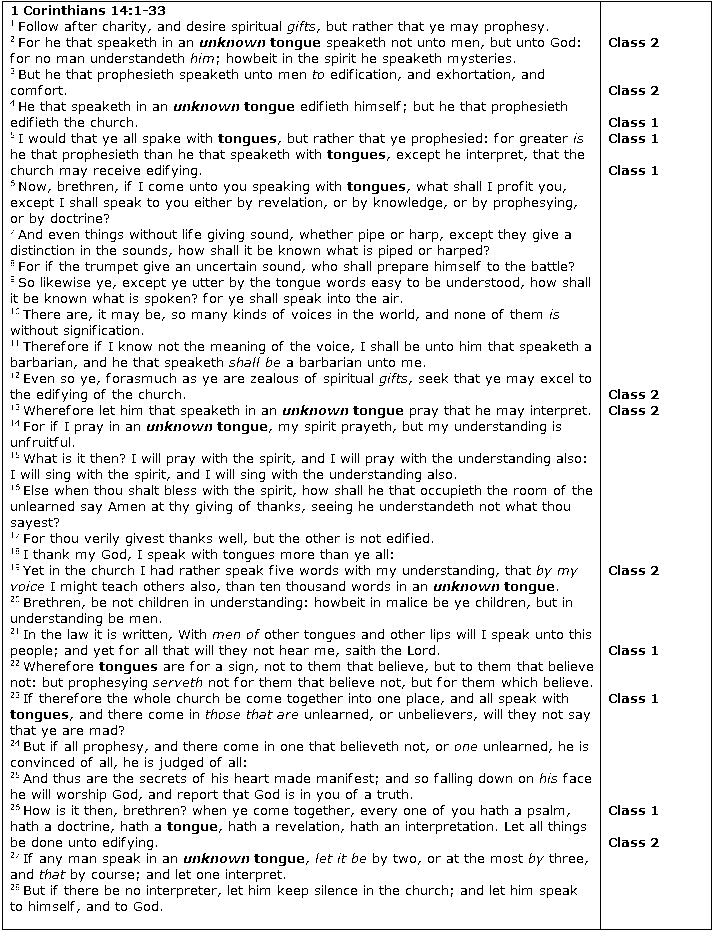
So you can
see that on this basis how futile
it is to go further in discussion. But we will. You see?
It’s a useless exercise if you try
and shoe-horn Class 3 Random Mouth
Noises without meaning into the discussion.
It’s like
a size fourteen foot attempting to
cram itself into a size six shoe! Totally out of place! It doesn’t fit!
Well
what about prophecy?
Surely that hasn’t finished? Yes it has and here’s the reason. At the
time of
Paul writing this epistle, there are another
20 New Testament books to be written – they were 2 Corinthians,
Mark, Luke,
Ephesians, Philippians, Colossians, Philemon, Acts, Titus, 1 Timothy, 2
Timothy, 1 Peter, 2 Peter, Jude, Hebrews, 1 John, 2 John, 3 John, John
and Revelation being the last one. You see
Paul is not so arrogant and puffed up to say that what was yet to be
written would
not contain prophecy. Of course, the book of Revelation is exactly that
– John
foretells the future!
But the
Babblers misunderstand when they think
they speak with the tongues of angels like Paul (1Cor 13:1). No they
don’t.
Paul doesn’t. He is saying “I don’t, but if
I could speak with the tongues of angels …”. Furthermore, the
tongues of
angels are not one of the seventeen languages at Pentecost.
Now the woman’s
role the last part of the chapter (v34-35) is very clear and to get
the
complete picture, we add other scriptures (1Tim 2; I Tim 5; Titus 2;
Eph 5)
Ch 15 = Resurrection
denial
Ch 16 = Travel arrangements
Harley Hitchcock
www.
AustralianBibleMinistries
.com
It’s infirmities, reproaches, necessities, persecutions and distresses for Christ’s sake (2Cor 12:10)
For more
information
contact:
AUSTRALIAN
BIBLE
MINISTRIES PO Box 5058 MT Gravatt East 4122 Qld, Australia